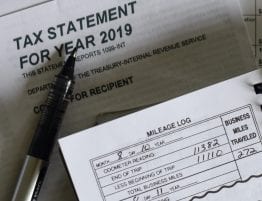
Filing your tax return late or paying late can lead to problems with the IRS. Though taxpayers can get an extension to file where they can file their tax return within six months from the filing deadline, it does not mean an extension to pay taxes. If taxes are not paid before the filing deadline, it can lead to IRS penalties and interest, which quickly balloon the original tax bill.
Confusion or lack of information that leads to back taxes can become a real pain, as the IRS can freeze bank accounts or confiscate property to collect back taxes owed.
To avoid paying more to the IRS or facing harsh collection actions due to late filing, non-filing, late payment and non-payment of taxes or face aggressive IRS collection procedures, stay informed about the actions the IRS can take in these cases. Huffington Post explains:
“What happens when you pay your taxes late?
The consequences of failing to pay your taxes by the April deadline depend on how late you are. At a minimum, though, you’ll be charged fees and interest starting the day after taxes were due.
The IRS charges a failure-to-pay penalty of 0.5 percent of the balance per month until it’s paid off. The maximum you can be charged is 25 percent of the total balance.
Interest is also charged on the outstanding balance, which is based on the federal short-term rate, plus 3 percentage points (the interest rate is subject to change).
‘The interest is compounded daily, beginning with the day the tax was due, and ending the day it is paid in full,’ said Christopher Jervis, president and founder of Lone Wolf Financial Services in Conyers, Georgia. ‘Compound interest really stinks when it is working against you.’ For example, say you owed $1,000 for your 2016 return, due on April 18, 2017. ‘Today, it is $1,458 and climbing, due to penalties and interest,’ Jervis said.
And don’t make the mistake of thinking that because you filed an extension to submit your tax return, your payment due date is also extended. If you were given an extension but expect to owe taxes, you’re required to fill out a Form 4868 and pay the estimated amount due. There is a bit of wiggle room, however; if you pay at least 90 percent of the taxes you owe with your extension request, you may not be charged the failure-to-pay penalty, assuming you pay any remaining balance by the extended due date.
The good news is that if you are late paying your taxes but set up an installment arrangement with the IRS, the monthly interest rate drops to 0.25 percent for each month the agreement is active and in good standing. It’s possible to arrange payments as low as $25 per month and terms as long as 60 months.
On the other hand, things can get hairy if you owe a lot of money and fail to pay on time. If you owe the IRS $10,000 or more, the federal government (and possibly the state as well) might put a lien on your property, according to Josh Zimmelman, owner of Westwood Tax & Consulting in Manhattan and Long Island.
‘This means that if you sell your home, the government will take what they’re owed from the sales price before you can see any profits for yourself,’ he said. ‘This could negatively affect your credit score as well because tax liens count as unpaid debts on your credit report.’
Tax levies are another possibility, in which the federal and/or local government collects the taxes you owe from various sources. ‘A taxpayer may see a notice of the IRS’ intent to garnish their wages … or levy their bank account basically ordering your bank to empty the account and pay the IRS for you,’ Jervis said.
In some instances, you could even face jail time. According to Zimmelman, you probably won’t be arrested if you don’t have enough money to pay your taxes. ‘But you could face jail time if you can afford to pay and just don’t, or if you fail to file at all.’
Filing taxes late is worse.
Speaking of not filing your tax return, that’s a really bad idea. Even if you don’t have the money to pay your tax bill, you should still file your return by the April deadline.
Filing your taxes late can result in a much higher failure-to-file penalty. You’ll be charged 5 percent of your unpaid taxes for every month that your return is late, up to 25 percent of the balance. For example, if you owed $1,000 in taxes, your failure-to-file penalty would be $50 per month, up to a maximum of $250. In the case that you’re subject to both a failure-to-file and failure-to-pay penalty in any given month, the maximum penalty you’ll be charged is 5 percent.
Also, if you file more than 60 days beyond the original due date or extended due date, you must pay a minimum fine of $205 or 100 percent of your unpaid taxes, whichever is smaller.
Even if you don’t file a tax return, the IRS might do it for you anyway. Since the IRS receives copies of your W-2s, 1099s, and any other income-related documents, it knows how much you earned for the year. ‘On top of that, they often use various tools to estimate what your income should have been, regardless of what was reported to them,’ Jervis said. However, when a Substitute for Return is filed, the IRS assumes a worst-case scenario it doesn’t consider any tax credits or deductions that might be available to you. ‘This means you end up getting assessed the maximum tax possible,’ Jervis said.
In addition to avoiding penalties and interest, there are other reasons you should file your tax return on time. ‘Many options for abating penalties or reducing your tax debt are” based on when things occurred,’ Jervis said. ‘For example, there are statutory collection periods that dictate how long the IRS has to collect a tax debt. The longer you wait to file, the further into the future that deadline gets pushed.’
You could also run into trouble if you owe back taxes when trying to buy a house. The mortgage company is going to want to see copies of your tax returns to make sure the information you provided is accurate. ‘No return on file? No real estate closing,’ Jervis said.
And again, there’s always the possibility of serving time. In fact, failure to file a return could result in one year in prison for every year you didn’t file. ‘If you’re found guilty of tax evasion or filing a fraudulent return, you could face five years in prison,’ Zimmelman said.
Keep in mind, however, the above only applies if you’re actually required to file a tax return. Adams pointed out that not everyone needs to file taxes if their income doesn’t meet certain thresholds. For example, you don’t need to file if you earned less than the standard deduction. However, you might want to file a return even if you don’t have to in case you’re owed a refund.”
Fill out the form for a free and confidential consultation.








